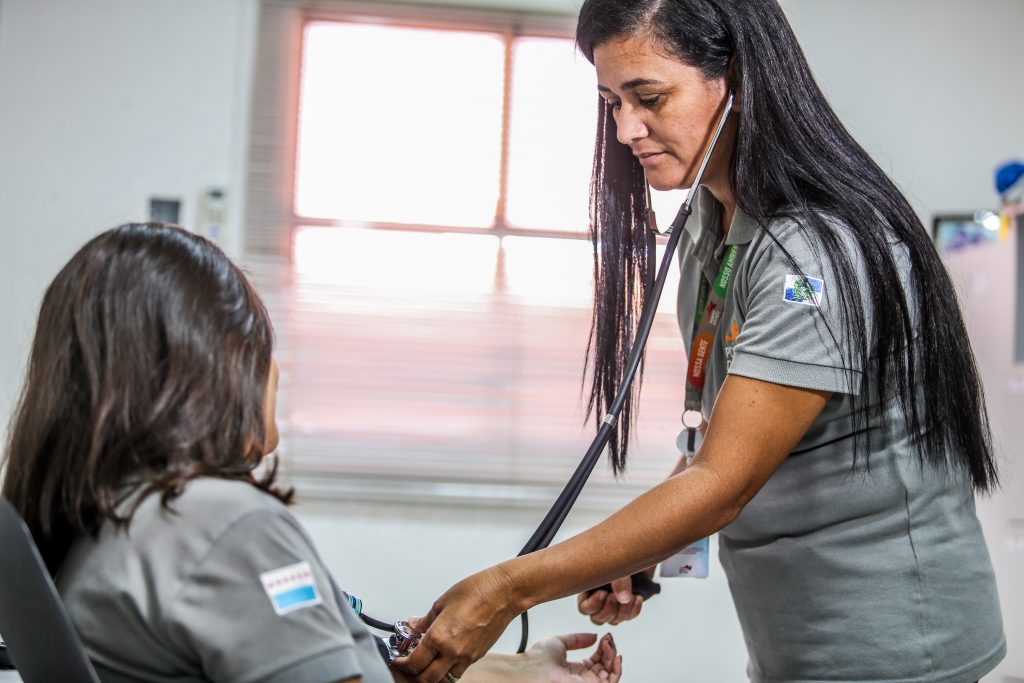Emergency Management
Home » Emergency Management
Efficient planning and response
A proper management structure and adequate allocation of resources for an efficient response are the pillars of Emergency Management at Porto do Açu Operações. To ensure efficient management and a response structure, we have an Incident Command System (ICS) in place and
record our procedures though the Emergency Plans.
To address the emergency scenarios identified, we have a dedicated structure and team to prevent and respond to situations such as victim rescue; medical evacuation; building, industrial, and forest fires; chemical spills; and marine oil spills. These flows are integrated with the port
community.
Access the Emergency Plans of Porto do Açu Operações at our Library.
Learn more about infrastructure and integrated emergency plans of Porto do Açu.
Operations and Emergency Response Center (CORE) :

To ensure the safety of Porto do Açu’s operations, we structured the Operations and Emergency Response Center (CORE) since 2021. CORE is responsible for maritime traffic management, corporate security, and risk
and on land and sea and coordinates tactical Port Administration resources.emergency management. CORE operates continuously, ensuring safety and operational efficiency.
Through CORE, we maintain an integrated risk management system for the complex and monitor important port operations and safety indicators.
Additionally, CORE centralizes emergency response management
Emergency Plans:
The integration of emergency plans and responses is managed through CORE, with mechanisms to expand, facilitate and improve the efficiency of responses in case of accidents that cannot be handled by the structures outlined in the emergency control plans of the complex’s companies.
- Area Plan: All operational terminals at Porto do Açu are part of the Area Plan, which aims to unify Individual Emergency Plans (PEI) to prepare for and respond to oil pollution incidents at sea. The Area Plan is a legal requirement coordinated by the State Environmental Department (Inea) and is articulated with other institutions such as the Brazilian Navy and Civil Defense.
- Mutual Assistance Plan (PAM): Composed of eight port terminals, PAM aims to coordinate joint actions between associated terminals and the Fire Department, Civil Defense, State Environmental Department (Inea) and Brazilian Navy to improve incident response protocols.
- Emergency Response Plan (PRE): Plan developed by the Porto do Açu Administration to manage accidental scenarios in common areas of the complex and access routes.
- Nautical Emergency Plan (PEN): Plan designed to manage accidental scenarios involving vessels in the navigation channel of Terminal 2, overseen by Porto do Açu Operações S.A.
- Individual Emergence Plan (PEI): Document defining the response actions for oil spill emergencies at terminals operated by Porto do Açu Operações S.A.
- Emergency Control Plan for the Multicargo Terminal (PCE T-MULT): Emergency response plan for managing potential accidental scenarios at the Multicargo Terminal (T-MULT).
- Emergency Control Plan for the South Mole (PCE Molhe Sul): Emergency response plan designed to address potential accidental scenarios at the South Mole Terminal.
To learn more about Porto do Açu Operações’ Emergency Plans, visit our Library
Efficient Planning and Response
A proper management structure and adequate allocation of resources for an efficient response are the pillars of Emergency Management at Porto do Açu Operações. To ensure efficient management and a response structure, we have an Incident Command System (ICS) in place and record our procedures though the Emergency Plans.
To address the emergency scenarios identified, we have a dedicated structure and team to prevent and respond to situations such as victim rescue; medical evacuation; building, industrial, and forest fires; chemical spills; and marine oil spills. These flows are integrated with the port community.
Learn about Porto do Açu Operações’s Emergency Plans
PRE – Port of Açu’s Emergency Response Plan
PEN – Port of Açu’s Nautical Emergency Plan
PEI – Oil Spill Response Plan for Terminal 2
PCE - Emergency Control Plan for the Multicargo Terminal
Learn about Port of Açu’s infrastructure and integrated emergency plans

Center of Operations and Response to Emergencies (CORE)
This integrates the Vessel Traffic Service (VTS), property security, and risk and emergency management to optimize operational control and increase synergies in routine operations and in response to emergencies.

Mutual Assistance Plan (PAM):
This plan formalizes the procedures for integrating the emergency teams of the companies located in the port in order to contribute to the adoption and dissemination of good practices that promote safe operations in the port complex.
Emergency Response Base (BPAE)
These teams and equipment respond to oil spills at sea in order to ensure the efficient response and management of incidents, mitigating environmental impacts.
Port of Açu Area Plan:
Coordinated by INEA (State Environmental Institute), the plan relies on the integrated participation of all terminals operating at the port to respond to oil emergencies at sea, together with other related institutions such as the Brazilian Navy, the Brazilian Emergency Management Agency, and the Brazilian Institute of the Environment and Renewable Natural Resources (IBAMA). The plan is being designed and is expected to be finalized in 2022. It will formalize the mechanisms for sharing resources to respond to emergencies involving oil at sea and integration with the National Contingency Plan.
Learn about other safety-related topics

Health and Safety Management
We focus on preventing and anticipating risks based on best global practices and on promoting a culture of safety via our PACTO pela Segurança Program.

Response to the COVID-19 Pandemic
When the pandemic started, we established a crisis management structure to take care of people, support the community, and safeguard the company’s operational continuity and financial health.

